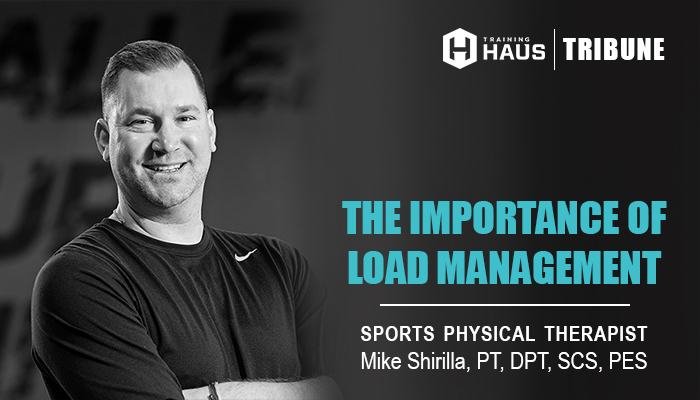
The Importance of Load Management
By now, athletes and sports fans alike are very familiar with the term “load management.” On any given night during the regular season, your favorite NBA or MLB player may spend the game on the bench because of it. But what exactly is “load management?”
In essence, it’s all about making sure athletes aren’t over-training or under-training to prevent possible injuries. The goal is to make sure athletes are ready to perform at their best in each and every game. Poor load management creates peaks and valleys that eventually increase the risk of injury and decrease performance.
There are many factors involved in properly managing the load of an athlete, including nutrition, sleep, training, strength and conditioning, game schedule, and minutes played. In my experience as a part of the medical staff at the University of St. Thomas and the US Soccer National teams, load management is critical in keeping players healthy and maximizing performance.
At the youth, high school, and college level, resources and staffing can be minimal, and this can lead to athletes not being properly taken care of. In my practice, I’ve seen numerous soccer players who have sustained injuries that I believe could have been avoided if their work load was better managed.
What Athletes, Parents, and Coaches Need to Know
As a Player: Talk with your coaches and parents about ways to better optimize your load management as you can always find ways to improve. The great athletes are always working on ways to get better, so strive to be your best version of you.
As a Parent: To start, sit down with your athlete and discuss their weekly and monthly schedule. Proactive planning is key. If your athlete’s schedule seems overloaded, it’s important to make adjustments and develop strategies to ensure proper recovery. Examples are tournaments and days with multiple sports. In these planning discussions, you most likely will find holes in their schedule to better manage their load. This is where you can reach out to coaches and medical professionals to further assist.
As a Coach: Take time to reflect on how things have been going with your team. Begin planning changes to your practice schedule to better prepare your athletes to be sharper when it is time to perform. The days before and after games/tournments are where less intensity and time of training are needed, so these are the best days to implement other strategies to help your players recover and prepare. Performing a quality warmup before each practice and game is also essential in decreasing injuries and to properly prepare your team to compete.
Now that you’re aware of some of things to start working on to improve load management, here are some additional resources to further assist:
- Sports Performance at Training HAUS: This can be incredibly beneficial for athletes. Our team of highly-skilled providers can build customizable plans and focus on ways to reduce injuries and optimize performance. Our staff is made up Sports Performance coaches, Physical Therapists, Massage Therapists, Sports Chiropractors and Sports Dieticians that all work closely together with athletes and their needs. Sports Performance training is available at Training HAUS in Eagan, TCO Sports Performance locations or at your school, field or facility.
- Andy Guard’s webinar: My US Soccer colleague’s video is a must-watch if you are coach looking to improve your skills in load management. This is crucial for daily/weekly practice programming to ensure your team is achieving optimal performance: https://www.ussoccer.com/bendthecurve/webinars
- Prevention programs: These programs affect many aspects of sport – you don’t just see reductions in injuries, but you also see increases in performance metrics. Athletes that follow a prevention program show increased muscle strength and physical performance measures along with reduction in injuries and time lost when injured. Reach out to us at Training HAUS, and we can help develop a customized program.
- FIFA 11+ Injury Prevention: This program is proven to reduce ACL and other soft tissue injuries while increasing performance. This program is free and can be used for sports other than soccer: fifamedicalnetwork.com
Key Takeaway
Load Management is a multifactorial approach to maximizing performance and preventing injuries. Hopefully this article will help you identify a few areas that you personally (or your team) might need to improve upon to get closer to proper load management. Professional teams have a multitude of resources and staff to track and monitor the load of their players, but at the youth, high school, and college levels, planning, proper sleep (8+ hours), eating a balanced and healthy diet and performing a warm up are a good place to start.
References
- Monajati A, Larumbe-Zabala E, Goss-Sampson M, Naclerio F. The Effectiveness of Injury Prevention Programs to Modify Risk Factors for Non-Contact Anterior Cruciate Ligament and Hamstring Injuries in Uninjured Team Sports Athletes: A Systematic Review.PLoS One. May 12, 2016;11(5):1-15.
- BizziniM, Impellizzeri F, Dvorak J, Bortolan L, Schena F, Modena R. Junge A. Physiological and performance responses to the “FIFA 11+” (part 1): is it an appropriate warm-up? Journal of Sports Sciences, 2013 Vol. 31, No. 13, 1481-1490
- Hoyo M, Pozzo M, Sanudo B, Carrasco L, Gonzalo-Skok O, Dominguz-Cobo S, Moran-Camacho E. Effects of a 10-week In -Season Eccentric-Overload Training Program on Muscle-Injury Prevention and Performance in Junior Elite Soccer Players. International Journal of Sports Physiology and Performance. Vol. 10, Issue 1, 46-52.
- Dustin R. Grooms, MEd, ATC, CSCS*; Thomas Palmer, PhD, ATC, CSCS†;James A. Onate, PhD, ATC, FNATA*; Gregory D. Myer, PhD, FACSM CSCS*D*‡§; Terry Grindstaff, PhD, PT, ATC, CSCS. Soccer-Specific Warm-Up and Lower Extremity Injury Rates in Collegiate Male Soccer Players. Journal of Athletic Training 2013;48(6):782–789
- https://www.ussoccer.com/bendthecurve/webinars
- https://www.fifamedicalnetwork.com/lessons/prevention-fifa-11

